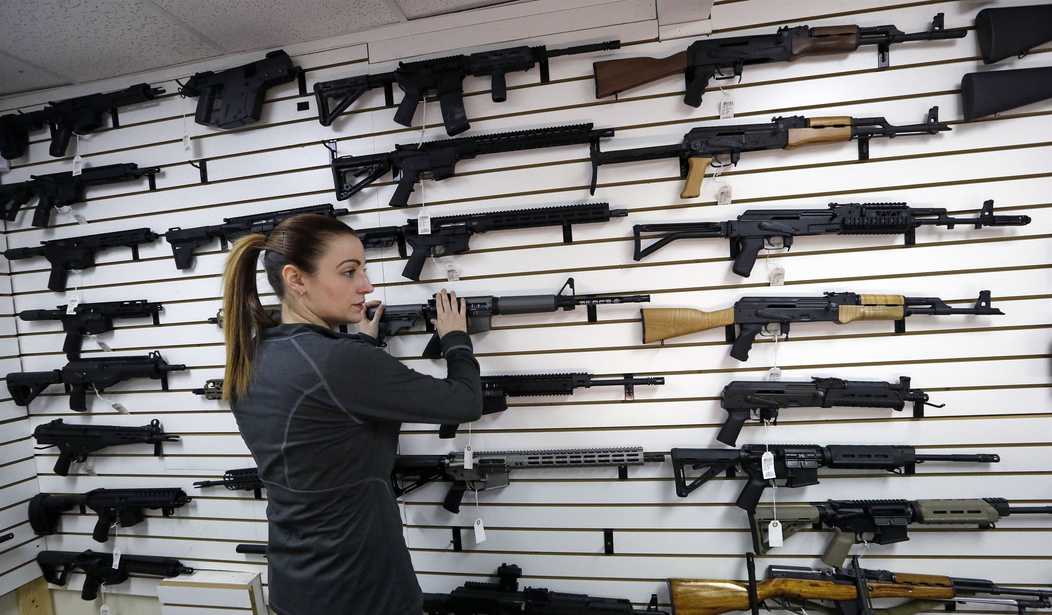On gun issues, never underestimate the capacity of leftist media to distort, obfuscate, and downright lie. If they can simultaneously smear a pro-Second Amendment legislator, so much the better.
Such was the piece by McClatchy newspapers, which recently spun an elaborate yarn based on firearm tracing reports and false accusations against Second Amendment defender Senator Ted Budd (R-NC). And what was Sen. Budd’s “crime?” Owning a gun shop and firing range named “ProShots.”
“NC senator’s gun shop among hundreds monitored by ATF for weapons traced to crimes,” headlined the piece, which breathlessly described his ostensible transgression: “For the third year in a row, the gun shop owned by U.S. Sen. Ted Budd was among hundreds across the country flagged by federal authorities in 2023 for selling weapons that were later traced to crimes, according to newly released records.”
I suppose that would make ProShots a top tier purveyor of “crime guns” … if it were true.
For decades, gun ban advocates have misrepresented Bureau of Alcohol, Tobacco, Firearms and Explosives (BATF) tracing reports to push their agenda – including suing gun-makers into oblivion – leading then-Congressman Todd Tiarht (R-KS) to introduce the “Tiahrt Amendment” to Department of Justice appropriations bills which, since 2003, have restricted release of gun tracing data largely to statistics and criminal investigations.
Over the years, however, anti-gun legislators have weakened the Tiarht Amendment to maliciously brand federally licensed gun dealers (called “FFLs”) as “rogue dealers.” McClatchy’s latest disinformation stems from a Freedom of Information Act request by “Brady United,” the most recent incarnation of Handgun Control, Inc.
Recommended
Despite McClatchy’s assertions, traced guns are not “crime guns:” Guns used in crimes are not necessarily traced, and guns traced are not necessarily used in crimes, a long-acknowledged problem. Said a 2009 Congressional Research Service report: “Firearms trace data … may be biased by several factors,” further saying “traced firearms … may not be representative of firearms possessed and used by criminals” and “there remains significant variation over time and from jurisdiction to jurisdiction as to ‘when, why, and how’ a firearm is recovered and selected to be traced…” Mine was once traced during a traffic stop before being returned. Did that make it a “crime gun?”
According to Independence Institute research director David Kopel, “Violent crimes account for only one-seventh of BATF traces. At least half of BATF traces are for possession offenses. To the extent that any generalizations can be drawn from BATF trace data, these generalizations are about gun owners whose gun possession violated some kind of ordinance or statute, but who did not use their gun for illegal violence.”
“[T]he Congressional Research Service,” continued Kopel, “cautions that the ‘firearms (which the) Bureau of Alcohol, Tobacco and Firearms selected for tracing cannot be considered representative of the larger universe of all firearms used by criminals or any subset of that universe,’ because ‘the firearms selected for tracing do not constitute a random sample.’ As a result, ‘ATF tracing data could be potentially biased.’”
Kopel summarized, “To advocates of restrictive gun laws, BATF traces are like psychoanalyst's inkblots: the viewer always finds in them exactly what he wants to see.”
The “Demand 2” program in which ProShots participates, and on which McClatchy based its accusations, relies only on raw numbers of so-called “crime guns” recovered, not per capita sales. Statistically speaking, a large FFL that sells more guns, over more years, is more likely to have some of them used in crimes. Blaming successful gun dealers for crimes is like blaming large auto dealers for cars involved in drunk driving accidents.
Further inflating illusory raw numbers, McClatchy itself recently admitted that in 2023, North Carolina experienced a 19% increase in gun sales – exceeded only by Hawaii and North Dakota. Why did sales in ProShots’ home state increase? Because in early 2023, we repealed our archaic pistol purchase permit law, commonly abused by urban sheriffs to obstruct gun purchases. (My organization, Grass Roots NC, has filed four lawsuits over sheriffs’ obstructionism.) After repeal, gun purchases exploded.
Thanks to widespread civil unrest, national gun sales in 2021 and 2022, both cited by McClatchy, also spiked, further increasing the number of gun shops exceeding the low threshold (25 guns traced) which triggers BATF scrutiny.
Understand that every gun sale by FFLs is approved by the FBI through its computerized “National Instant Background Check System,” created by the 1995 Brady Act, which has failed to reduce crime but under which the Biden administration now proposes to register private sales.
ProShots was undoubtedly ensnared by Joe Biden’s weaponized ATF and the so-called “zero tolerance” program through which it has shut down hundreds of gun dealers for even minor paperwork violations – all, of course, part of a scheme to curtail gun ownership by executive order. If anything, ProShots should be congratulated for surviving the Biden quagmire.
Naturally, I pointed out these fallacies and more during interviews with McClatchy reporters, who downplayed or ignored every one because, after all, when it comes to ostensibly “mainstream” media coverage of gun issues, truth no longer matters.

























Join the conversation as a VIP Member